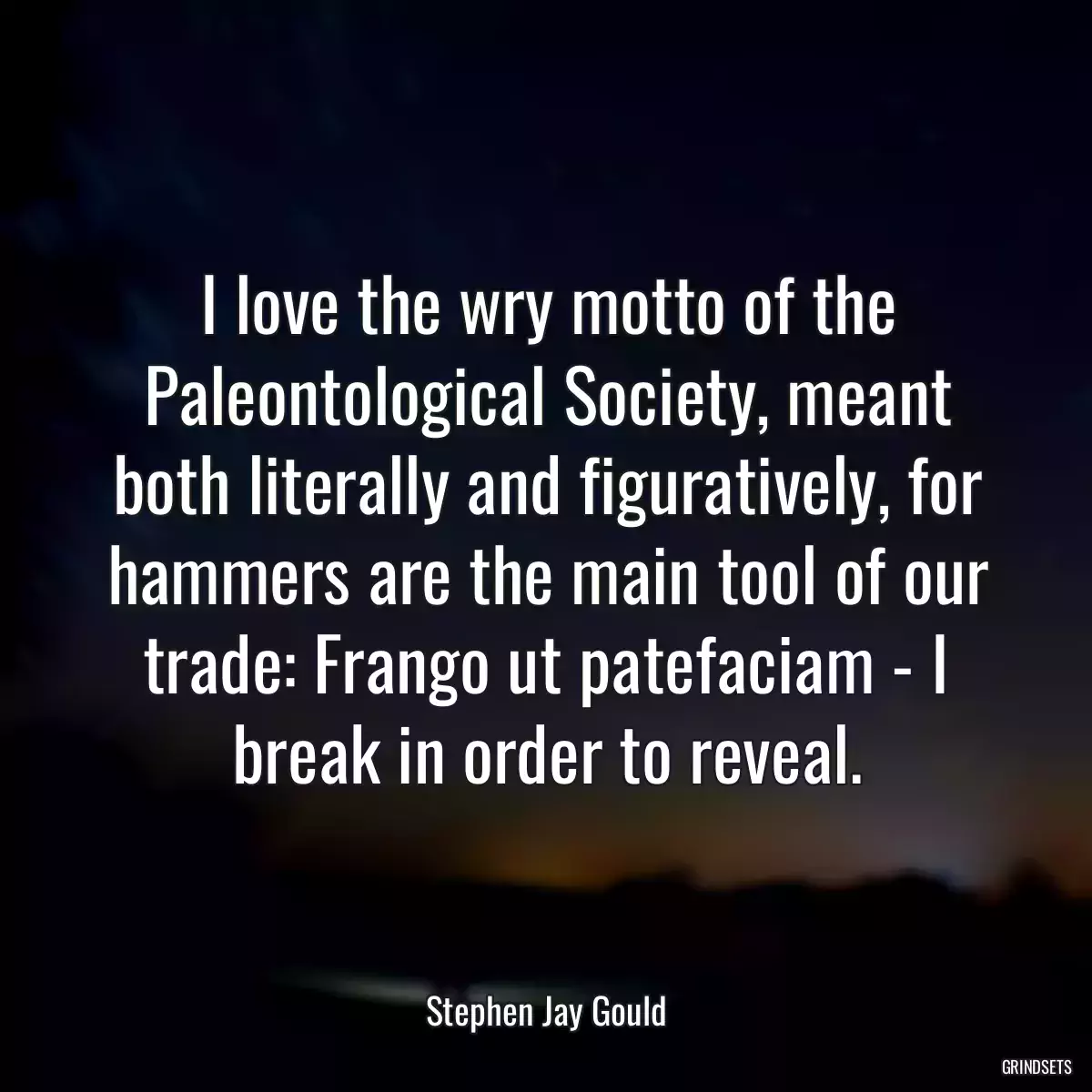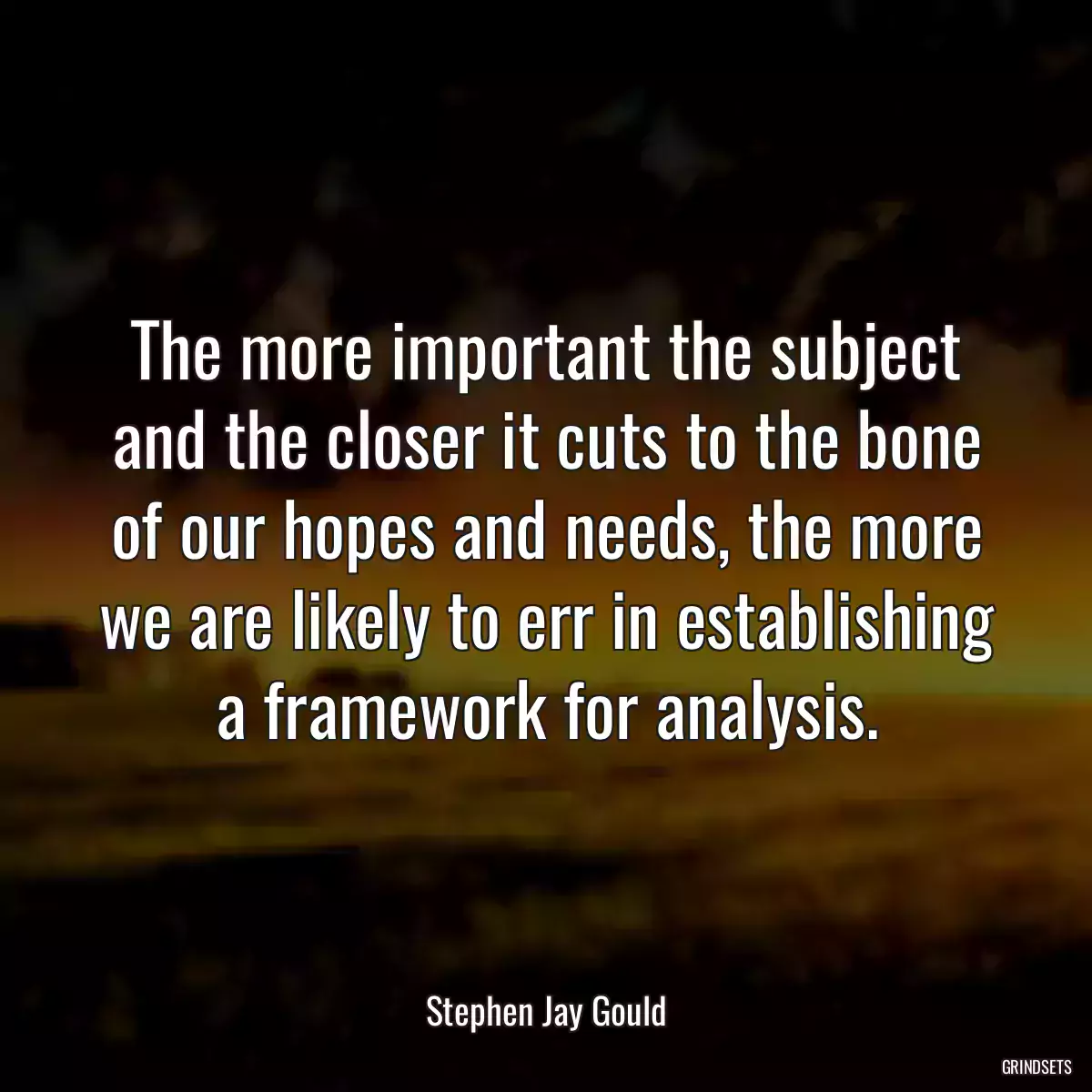
Quotes Stephen Jay Gould - page 2
Find dozens of Stephen Jay Gould with images to copy and share.

It's true that the level of scientific knowledge among adults is very low, but that's not because there isn't a natural interest. I think most kids are fascinated by the natural world. I've often said that if you could quantify the mental power involved in all the dinosaur names correctly known and correctly spelled by 5-year-old kids in America, you could move any mountain on earth.
Life is short, and potential studies infinite. We have a much better chance of accomplishing something significant when we follow our passionate interests and work in areas of deepest personal meaning.
If any issue should unite liberals and conservatives, anyone who cares about the integrity of human achievement or respect for human accomplishment, may we not all pledge to avoid the silly censoring that can lead to a codification of Orwell's Newspeak? Consider John Milton's reasons for why good arguments are often lost: 'For want of words, no doubt, or lack of breath!'
You may also like
The great merit of Stephen Gould's account of the disastrous history of phychometrics is that he shifts the argument from a sterile contest between environmentalists and hereditarians and turns it into an argument between those who are impressed with what our biology stops us doing and those who are impressed with what it allows us to do.
The journalistic tradition so exalts novelty and flashy discovery, as reputable and newsworthy, that standard accounts for the public not only miss the usual activity of science but also, and more unfortunately, convey a false impression about what drives research.
Creation science has not entered the curriculum for a reason so simple and so basic that we often forget to mention it: because it is false, and because good teachers understand why it is false. What could be more destructive of that most fragile yet most precious commodity in our entire intellectual heritage-good teaching-than a bill forcing our honorable teachers to sully their sacred trust by granting equal treatment to a doctrine not only known to be false, but calculated to undermine any general understanding of science as an enterprise?.
Science simply cannot adjudicate the issue of God's possible superintendence of nature.
Without a commitment to science and rationality in its proper domain, there can be no solution to the problems that engulf us. Still, the Yahoos never rest.
![Paleontologists [fossil experts] have paid an exorbitant price for Darwin\'s argument. We fancy ourselves as the only true students of life\'s history, yet to preserve our favored account of evolution by natural selection we view our data as so bad that we almost never see the very process we profess to study.](/fotos/95/95e2374e4c9f5f49f0e03fac57fb95d3.webp)
Paleontologists [fossil experts] have paid an exorbitant price for Darwin's argument. We fancy ourselves as the only true students of life's history, yet to preserve our favored account of evolution by natural selection we view our data as so bad that we almost never see the very process we profess to study.
Change is more often a rapid transition between two stable states than a continuous transformation at slow and steady rates. . . .Change occurs in large leaps following a slow accumulation of stress that a system resists until it reaches the breaking point. Heat water, and it eventually boils. Oppress the workers more and more and bring on the revolution.
Very little comes easily to our poor, benighted species (the first creature, after all, to experiment with the novel evolutionary inventions of self-conscious philosophy and art). Even the most "obvious," "accurate," and "natural" style of thinking or drawing must be regulated by history and won by struggle. Solutions must therefore arise within a social context and record the complex interactions of mind and environment that define the possibility of human improvement.
Something deep within us drives accurate messiness into the neat channels of canonical stories.
Nothing matches the holiness and fascination of accurate and intricate detail.
Evolution has encountered no intellectual trouble; no new arguments have been offered. Creationism is a home-grown phenomenon of American sociocultural history-a splinter movement ... who believe that every word in the Bible must be literally true, whatever such a claim might mean.
Historical science is not worse, more restricted, or less capable of achieving firm conclusions because experiment, prediction, and subsumption under invariant laws of nature do not represent its usual working methods. The sciences of history use a different mode of explanation, rooted in the comparative and observational richness in our data. We cannot see a past event directly, but science is usually based on inference, not unvarnished observation (you don't see electrons, gravity, or black holes either).
I am not [...] asserting that humans are either genial or aggressive by inborn biological necessity. Obviously, both kindness and violence lie within the bounds of our nature because we perpetrate both, in spades. I only advance a structural claim that social stability rules nearly all the time and must be based on an overwhelmingly predominant (but tragically ignored) frequency of genial acts, and that geniality is therefore our usual and preferred response nearly all the time. [...] [T]he center of human nature is rooted in ten thousand ordinary acts of kindness that define our days.
But we all recognise the primary foible of frail humanity - our propensity for embracing hope and shunning logic, our tendency to believe what we desire rather than what we observe.
You may also like

I despair of persuading people to drop the familiar and comforting tactic of dichotomy. Perhaps, instead, we might expand the framework of debates by seeking other dichotomies more appropriate than, or simply different from, the conventional divisions. All dichotomies are simplifications, but the rendition of a conflict along differing axes of several orthogonal dichotomies might provide an amplitude of proper intellectual space without forcing us to forgo our most comforting tool of thought.